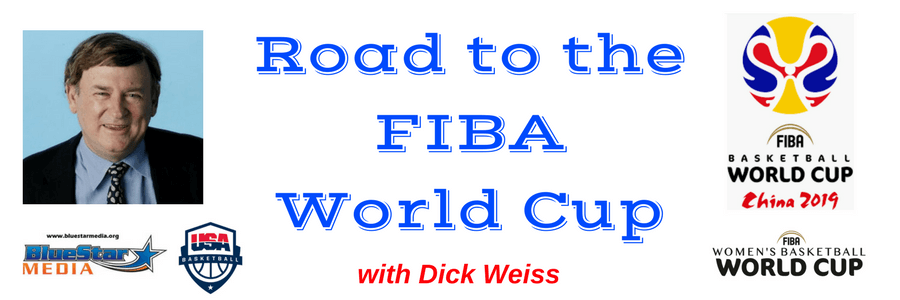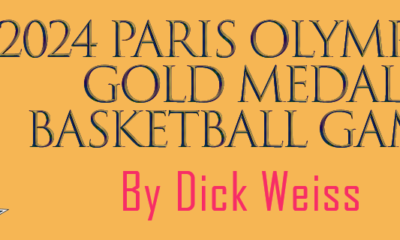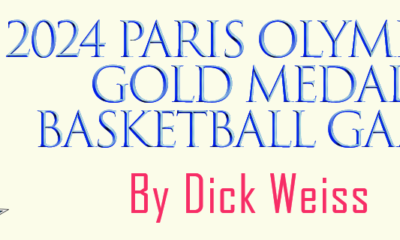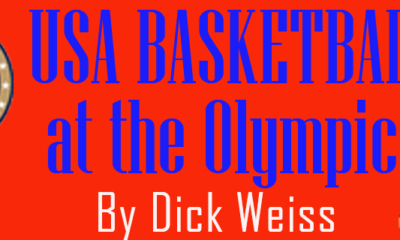
GREENSBORO, N.C. — When FIBA made the decision to model its men’s 2019 World Cup in China after soccer’s World Cup, it arranged for a similar qualifying process with 16 teams from the Americas zone competing for seven of the 32 spots with territorial pool play over the next 6 months. .
The USA World Cup Qualifying team, has been paired with Mexico, Puerto and Cuba in home and home first round pool play, with the top three advancing to the second round, with three two-game windows being played in November, February and June.
But with the current calendar and lack of established stars, it is has been not always been easy to generate interest.
Where soccer’s World Cup qualifying is centered around the premier leagues in each country and star players get time off to play for the national team, basketball’s World Cup is centered around the NBA, which is in the midst of its regular season. Owners are not about to take a chance on letting their best players participate in qualifying rounds, even if they wanted to participate.
In order to field a competitive team, USA Basketball selected its qualifying team from a select group of players from select players from the G-League, the NBA’s development league. Most of them are not household names. But they were good enough to rally to defeat Argentina and win the gold medal in the Americas Cup at Buenos Aires last summer and should be good enough to defeat any team in their pool if they can keep most of their nucleus healthy.
The US qualifying team, which returned five players from the Americas Cup team, defeated Mexico, 91-55, before a crowd of 2,500 at the Greensboro Coliseum Field house Sunday to increase its record in Group C to 2-0.
The Americans made it look easy, considering they had only been practicing for nine days. They got 14 points apiece from guard Markel Brown from the Oklahoma City Blue, forward Jonathan Holmes from the Maine Red Claws, Xavier Munford from the Wisconsin Herd and forward Travis Wear from the South Bay Lakers, who also grabbed 10 rebounds for a double double and blow by a Mexican team that was missing its three best guards due to injury.
“I was very, very proud of our team,” USA head coach Jeff Van Gundy said. “Nine days together, they worked hard. It’s really hard to put a group together that quickly unless players are selfless, and we had a bunch of selfless guys who sacrificed not only their time, but participating in the G League, to represent their country. I couldn’t be more proud of them. i’m happy with the result, because I really think this type of competition will help their careers. The thing that I gained in my short stint with USA is a true appreciation for the players who had not had it easy. I really appreciate what they go through on a daily basis.”
Van Gundy, an excellent teacher and and successful NBA coach with the New York Knicks and Houston, is currently an NBA analyst for ESPN. But he agreed to take time off to coach this team through qualifying after being contacted by USA Basketball last summer because 2020 Olympic coach Gregg Popovich would be busy with the San Antonio Spurs. He is learning about the international game along with his players.
“USA Basketball, I’m learning a lot,” Van Gundy admitted. “(Olympic senior manager) Sean Ford has been so important and vital in trying to teach me about what goes into winning at this level. He always says to me that we should never sacrifice speed for size. We should always play a speed game. The more I watch, the more I learn and what we have to do is speed and intelligence. You have to have basketball intelligence to play international basketball, because your mental strength is going to be tested. It’s more physical and more demanding than any G League game, just because of the physical contract.”
The U.S. defeated Puerto Rico, 85-78, that was supposed to be played in San Juan but was moved to Orlando because the island suffered so much damage this fall from Hurricane Maria. “I thought in the first game, we got hit with a hay maker,” Van Gundy said. “They made the first six shots for threes. I apologized for the team. It was a bad plan. That was on me. Thankfully they bailed me out because from that 18-10 deficit though the rest of the game, we competed at a really high level. I don’t think people understand how hard a game that was, from Puerto Rico’s talent, to the crowd, to really being our first game.”
The Americans looked much better against Mexico, despite playing without point guard Larry Drew, who pulled a hamstring the day before Puerto Rico and getting just 13 minutes from valuable guard Reggie Heard, who suffered a sprained left ankle.
The U.S. got off to a fast start, making seven 3-pointers, highlighted by 3-of-3 shooting from beyond the arc by Holmes, as the U.S. jumped out to a 25-12 at the end of the first quarter. The USA turned the game into a route, expanding the lead to 72-37 by the end of the third quarter.
“We came out and executed our game plan,” Wear said. “We hit them first right off the bat. We let them go on a little run at the end of the (first) half. But, we came back and executed down the stretch and got it done.”
USA shot a solid 50.8 percent (33-of-65 field goals) from the field, but it was even better from 3-point, where it was 54.2 percent (13-for-24 from the three) Despite having a short training window in which to develop team chemistry, the USA also tallied 21 assists, including seven from Donald Sloan (Texas Legends). The U.S. offense was not the only highlight, however. It’s defense also was impressive, limiting Mexico to 31.1 percent shooting and using their speed and depth to convert 18 turnovers into 21 points.
“It lets you know that the G League has a lot of talent,” Munford said. “A lot of different guys, versatile guys that can play different positions.”
Van Gundy would like to keep the bulk of this team together for the next two windows.
“The five guys we brought back gave us a good nucleus,” he said. ‘What we saw with many of the other players like Travis, is that going forward if they’re available, we would love to have them back because the advantage the other teams have on us is that they get to practice more, they’ve played together since a young age and they have that continuity. I would love to have more continuity as we go. The more continuity we have from window to window, the better it will serve us.”
Dick Weiss is a sportswriter and columnist who has covered college football and college and professional basketball for the Philadelphia Daily News and the New York Daily News. He has received the Curt Gowdy Award from the Naismith Basketball Hall of Fame and is a member of the national Sportswriters Hall of Fame. He has also co-written several books with Rick Pitino, John Calipari, Dick Vitale and authored a tribute book on Duke coach Mike Krzyzewski.









